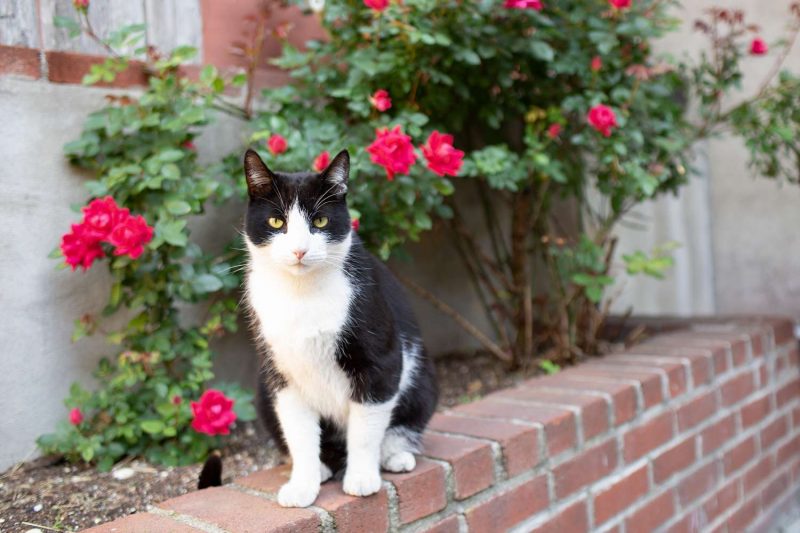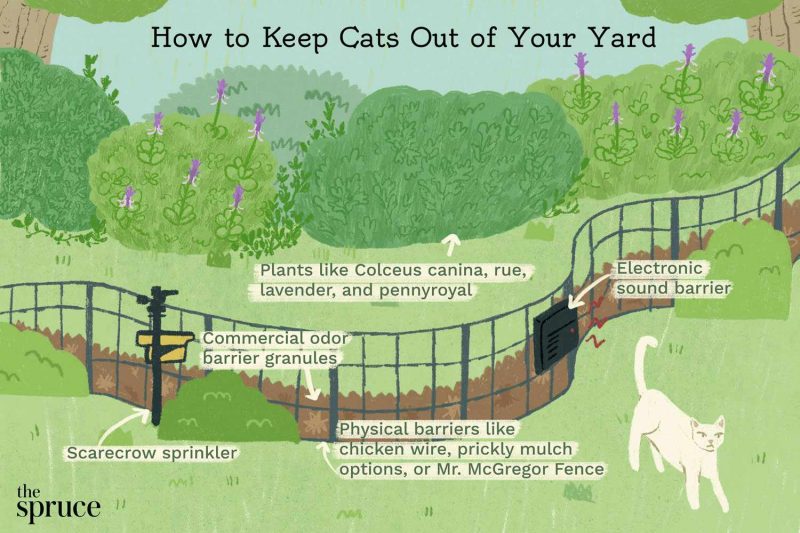House cats, wild cats, and stray felines might explore your yard or garden out of curiosity, for mating, hunting, feeding, or to claim territory. Some might even be in search of a new home. Given their remarkable skills in climbing and jumping, it can be difficult to prevent them from accessing your outdoor space. Thankfully, there are humane methods to deter cats from your yard.
You can deter cats from digging in your garden or wandering around your property by using various strategies or products. It’s important to vary your methods frequently, as a new cat in the area may not respond to your typical techniques. By frequently changing your approach, you can increase your chances of success. Consider exploring effective cat repellents and methods to prevent these furry visitors from treating your garden as a litter area.


Contents
Top Scents to Deter Cats
A cat’s sense of smell is exceptionally acute. While humans possess around 5 million odor receptors in their olfactory system, cats boast an impressive 200 million. This heightened sensitivity means that you might notice the scent of cat urine in your yard, which could be particularly strong for you. If your yard or garden contains odors that cats find unpleasant, you could effectively deter them. Consider implementing the following strategies.
Commercial Cat Deterrents
Commercial cat repellents employ an odor barrier technique to keep cats away from specific locations. For instance, Shake Away Cat Repellent powder features the scents of natural predators, such as coyotes, foxes, and bobcats, which cats instinctively avoid. This repellent is available in a granular format, allowing you to easily spread it in the targeted area. It is both non-toxic and organic, ensuring it is safe for your plants.
Plants with offensive properties
Certain plants emit scents that are unappealing to cats. One example is Coleus canina, commonly known as the scaredy-cat plant. This plant can also help deter dogs from your garden. Additional plants that are suggested for repelling cats from your yard include rue, lavender (which is also resistant to deer), and pennyroyal. Consider planting these among your other flora.
Citrus Fruits and Various Kitchen Staples
Incorporate the peels of oranges, lemons, limes, and grapefruits into your gardening practices. While some individuals opt for spreading used coffee grounds or employing mothballs, others may utilize eucalyptus or vinegar. Although cayenne pepper flakes can be used, it’s worth noting that this method is not humane, as it can cause irritation and discomfort.
Physical Obstacles to Deter Cats
Affordable physical barriers can assist in preventing other pests from entering your garden and yard as well.
Poultry Netting
Implement physical deterrents such as chicken wire placed over your soil or mulch in the planting area prior to planting. Felines tend to dislike chicken wire or any prickly surfaces. With wire cutters, you can create openings in the chicken wire that are sufficiently sized for your plants to be installed.
Crystalline Landscape Covering
To create a mulching solution, consider utilizing sharp-edged pine cones, holly trimmings, crushed eggshells, or stone mulch. Cats tend to favor digging and relieving themselves in loose soil, and these coarse materials will deter them.
Rug Runner
In different spaces, consider placing a plastic carpet runner with the textured side facing upwards to deter cats from sitting or resting.
Electric Fencing
An electric wire fence may appear to be a drastic measure, but consider a more humane alternative designed to deter rabbits from entering gardens. These fences for smaller animals deliver mild shocks if they attempt to cross the boundary.
Water-Resistant Solution for Felines
Water serves as a physical barrier that can deter cats, much like kryptonite. While it poses no danger to felines, their negative experiences with water can lead them to associate it with your yard, encouraging them to steer clear of your property.
Squirting Soakers
If you find cats in the restricted zone, you might consider using a Super Soaker or a comparable water gun to spray them. This approach helps to convey the message that they are not welcome in your garden.
Hydration Equipment
As it’s not feasible to spend all day, every day in your garden, consider investing in a water device like a ScareCrow Sprinkler. This device senses the presence of intruders and releases a spray of water to deter them. Just be mindful not to accidentally soak your neighbors or other guests in the process!
Cat-Repelling Sound Barriers
Cats possess a significantly broader range of hearing compared to humans. Consider using these auditory devices to keep cats away.
Gadgets and Electronics
Cats possess a significantly broader hearing range compared to humans. Cat Stop is a device designed to deter cats, emitting a high-frequency sound that is inaudible to people but intolerable for felines. Setting it up is straightforwardsimply position the device to face your garden or yard. When the motion sensor detects a cat, Cat Stop activates, emitting its high-frequency sound to frighten the cat away.
Sound Plus Spray Insect Repellent
The SsssCat! Motion-Activated Spray for Dogs and Cats is a deterrent tool that combines sound with a misting repellent. This safe motion sensor and customizable non-toxic spray can reach a distance of up to 3 feet.
Homemade Audio Equipment
Create a sound-making contraption by filling an empty coffee can with marbles or small stones, which can be knocked over by a cat walking along a fence. Alternatively, consider using a delicate bell or wind chimes that will ring when a cat triggers a vibration.
Discourage Cats from Your Space
Maintain a tidy and organized yard, garden, and property. A clean environment can help minimize the presence of stray and roaming cats. Consider taking the following steps:
- Avoid feeding pets outdoors: Refrain from giving food to your dogs or other cats in your yard. The scent of food can lure in other animals, including cats. After using your outdoor grill, make sure to clean it thoroughly to eliminate food remnants and reduce odors.
- Ensure that your garbage containers are properly secured to prevent cats from digging through your waste.
- Promptly clean any urine spray: As soon as you notice urine spray on walls or doors, clean it immediately. Cats use urine spray to establish their territory. Utilize an enzyme-based odor neutralizer to eliminate these territorial markers and discourage future spraying.
- Deter unwanted animals: Cats enjoy hunting for sport. Ensure your yard is uninviting for the creatures that attract feline attention. Remove any overgrown vegetation and debris that could provide shelter for mice and other small animals that cats enjoy chasing.
- Seal off any openings: Close off any openings that could provide entry to sheds, garages, or spaces beneath decks or porches. Stray cats and their potential prey often look for shelter in any accessible location.
- Ensure bird feeders are inaccessible: Protect bird feeders by utilizing baffles and positioning them in locations that are safe from potential threats posed by cats.
Additional Suggestions for Deterring Cats
- Create a designated patch of catnip in a cozy corner of your yard to provide a safe and enjoyable space for your cats.
- Place a sandbox at a distance from your home, close to the catnip plants, to attract your cat’s waste.
- Collaborate with your neighbors to keep their pets from entering your yard or preying on the birds you wish to safeguard. Recommend that they equip their cats with bells and colorful collars to enhance visibility and give birds a better chance to evade them.
- Promote trap-neuter-return initiatives, feline shelters, or various community efforts that provide food or assistance to feral cats, enabling them to support a greater number of strays.
- If you come across lost cats, consider bringing them to animal control or a shelter. However, before doing so, inspect them for identification tags to reach out to their owner and address the situation.

